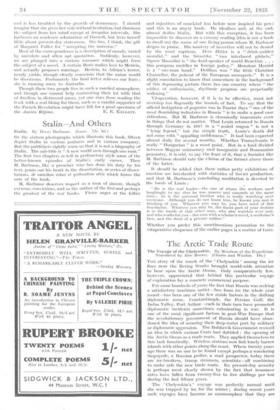Stalin—And Others
OF the sixteen photographs which illustrate this book, fifteen depict Stalin, in various. postures and in various company. But the publishers rightly Warn us that it is not a biography of Stalin. The sub-title is " A new world seen through one man." The first two chapters re-tell in perfunctory style some of the better-known episodes Of Stalin's early career. Then M. Barbusse, like' a preacher who has done his duty by his text, pours out his heart in the dissertation, or series of disser- tations, de oninibus rebus el quibusdaut sills which forms the core of the book.
11. Barbusse deserves respect as a man of sincere, though extreme, convictions, and as the author of the first and perhaps the greatest of the war books. Fierce anger at the follies and injustices of mankind has before now inspired his pen ; and this is an angry book. He idealises and, at the end, almost deifies Stalin. But with this exception, it has been
impossible to discover on a cursory reading (this is not a book to dwell on) the name of one living person whom M. Barbusse deigrfS•td praise. • :His mastery of invective will not be denied by the most eaptiods. Herr Hitler is a " drink-sodden
moralist," and the Swastika " two interlaced gibbets." Signor Mussolini is " the loud-speaker of world Reaction . . . this pompous nieddler. in foreign policy." Monsieur Herriot is a- " oneman band:" Dollfuss was " the little Christian
Chancellor, the polecat Of the European menagerie." It is a slight- consolation to know 'that somewhere in the background of this depressing picture there -lies one country where " the eddies of enthusiastic, rhythmic progress are perpetually widening."
Vituperation, however, if it is to be effective, must not' overstep too flagrantly the bounds of fact. To say that the official instigation of pogroms was in Tsarist days " one of the most flourishing industries in Russia " is to make a good ease
ridiculous. But M. Barbusse is chronically inaccurate even in things that do not matter. That Lenin returned to Russia through Germany in 1917 in a sealed wagon is not a " lying legend," but the simple truth. Lenin's death did not come with " appalling suddenness." It had been expected almost daily for several months. Whether Transylvania is really " Hungarian " is a moot point. But in a land divided between Magyar aristocracy and bourgeoisie and Roumanian peasantry, it is odd, to say the least of it, that a Socialist like
M. Barbusse should rate the claims of the former above those of the latter.
It should be added that these rather petty exhibitions of emotion are interlarded with statistics of Soviet production, and that M. Barbusse's concluding meditation is devoted to the tomb of Lenin :
" He is the real leader—the one of whom the workers used laughingly to say that ho was master and comrade at the same time ; he is the paternal brother who is really watching over everyone. Although you do not know him, he knows you and is thinking of you. Whoever you may be, you have need of this benefactor. Whoever you may be, the finest part of your destiny is in the hands of that other man, who also watches over' you, and who works for you—the man with a scholar's mind, a workman's face, and the dress of a private soldier."
Whether you prefer this sanctimonious peroration to the vituperative eloquence of the earlier pages is a Matter of taste.






























































































 Previous page
Previous page